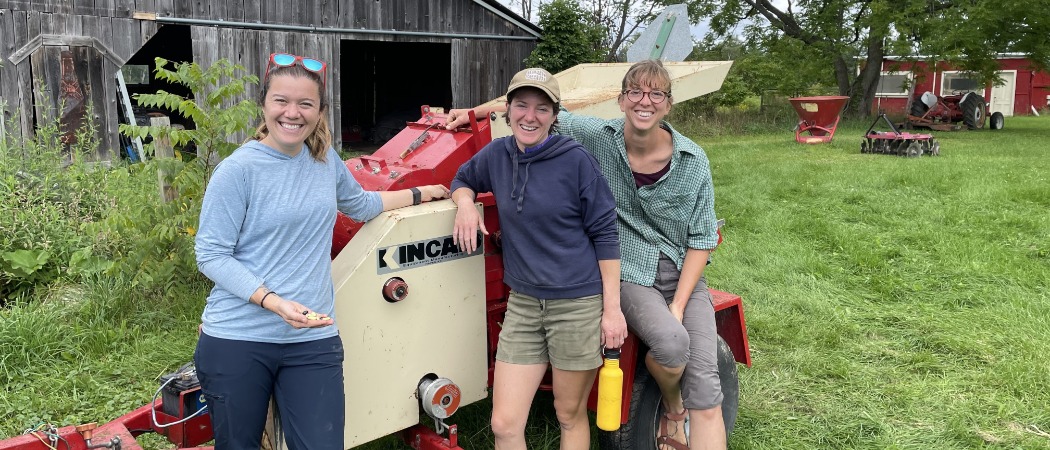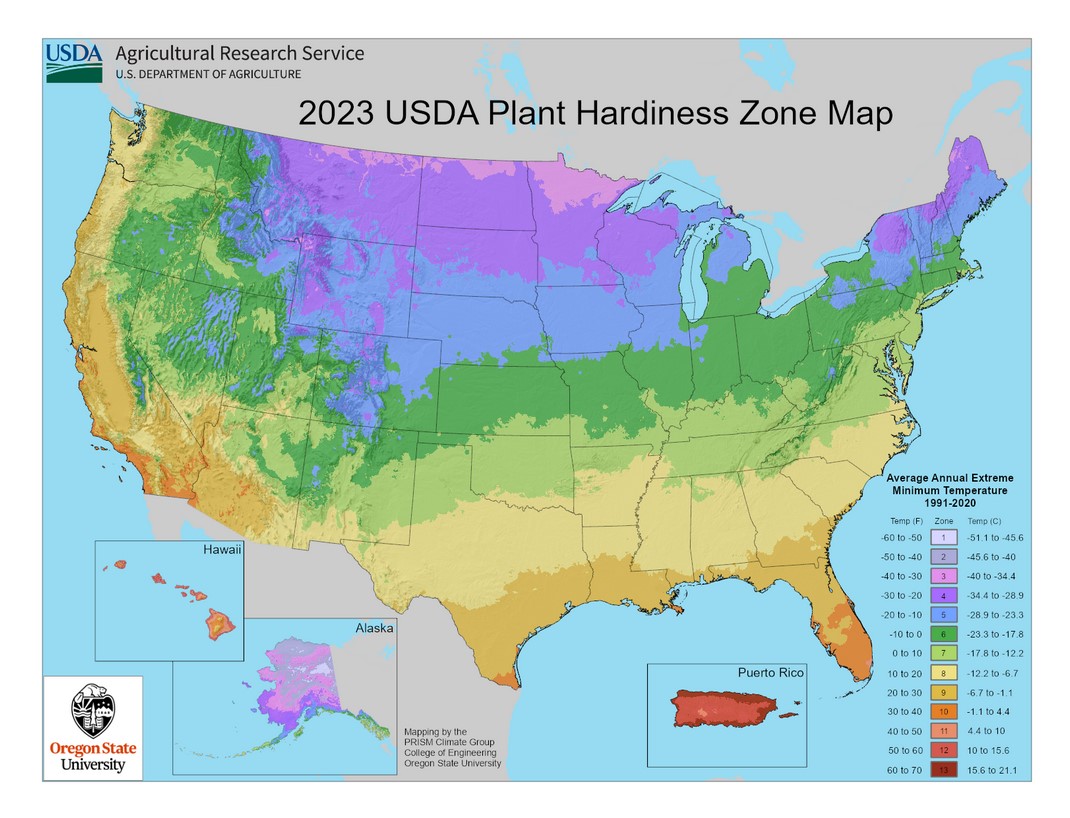| Winter Greetings! Here in western New York in mid-December, winter has been slow to arrive. We just received a light dusting of snow while our friends to the east grapple with major flooding. Weather forecasts are not equivalent to climate change but it's hard to not notice a trend here. Winters are warmer, springs are wetter, the predictability of growing season conditions are becoming harder to come by. Our world is changing and many point towards agriculture as a culprit of that change. It is true that large-scale livestock production emits methane, a major contributor to greenhouse gases. But the farmers I interact with every day are doing so much to offset those emissions and provide our community with healthy, nutritious food. I believe our farmers are part of the solution to how we approach the messy, complicated problem of climate change. To that end, you will find resources and news in this newsletter highlighting opportunities to help you better understand climate science and improve your farm's resilience. American Farmland Trust is a major partner in several large-scale Climate Smart Commodities projects, which will kick off in 2024, bringing resources, education, and new technologies into the hands of farmers here in New York. I hope you join us at one of our upcoming New York Women for the Land events to learn more about how we can better steward our land, not just for ourselves, but for many generations to come. Thank you all for being part of this community. In gratitude,
Stephanie Castle
New York Women for the Land Program Manager
American Farmland Trust |
| | National Climate Assessment Released The Fifth National Climate Assessment (NCA5), released November 14, documents observed and projected vulnerabilities, risks, and impacts associated with climate change across the United States and provides examples of actions underway in many communities as well as opportunities to reduce impacts. The report includes an interactive online NCA5 Atlas, which allows users to explore the latest localized precipitation and temperature projections. |
| |
|
| |  | Farmer Spotlight: Kristen Loria and Buttermilk Bean Buttermilk Bean is a farmer collaborative in the Finger Lakes selling locally grown, organic specialty dry beans and popcorn via a winter bean club and wholesale/retail. Learn more about founder, Kristen Loria, and her journey below. How did Buttermilk Bean come to fruition? After working full-time on farms for 5 years, I went back to school for a M.S. as I was interested in working in Extension. During this return to academia, I always planned to start my own farm and dreamed of growing dry beans in particular, on a small scale but still using mechanization. I was actually able to focus much of my M.S. research on trialing and breeding dry beans, so that experience only encouraged my fledging bean fixation and I learned a lot about both the diversity of dry bean varieties available, and the rich history of dry bean production in the Northeast. After I finished by M.S. and took a permanent position (I currently am an Extension Support Specialist in Soil and Crop Sciences as Cornell), I was able to start my business. Although farming on the side of a full-time job can be a lot, growing field crops part-time is definitely more doable than more labor-intensive and perishable crops such as vegetables, and I enjoy the synergies of working in Extension as well as farming myself. What was your biggest surprise/what did you least expect when you began Buttermilk Bean? A few years into the business, this is something that I’ve been reflecting on a bit lately – I think on one level I have been surprised how opportunities I didn’t anticipate have come along, just following threads of an idea you are excited about, and realizing there are lots of other people excited about this same thing. Whether they are fellow farmers reaching out with interest in growing with us or customers that are excited about what we are doing, I’ve been amazed by and really grateful for the enthusiasm I’ve encountered along the way. Also reflecting on how absolutely terrified of starting a business I was at the beginning, and realizing how empowering the experience has been of realizing that it’s something that I have the skills to do, and that I can at least see a path of long-term success. I didn’t come from an entrepreneurial background growing up, so the idea of starting my own farm and running a business was very foreign and intimidating for a long time. Setting incremental goals for my business size and scale has also been very helpful – at the beginning it was easy to be scared off by the scale of production that I felt like I “had” to be at to grow dry beans, but just improving equipment and other system efficiencies one year at a time now makes the process of scaling up less intimidating. What is your favorite way to prepare dry beans? This might be the hardest question yet! Lately I have fallen in love with mole baked beans – I just buy a pre-made mole paste (shoutout to the Dona Maria brand, or if you are lucky enough to have a Mexican grocery they will likely have some) and mix some into cooked beans (soaked and cooked in an Instant Pot first) along with a little onion and maple syrup, then baked as you would with normal baked beans. It’s a really delicious sweet and savory flavor that goes so well with many different types of beans, but especially creamier ones like pinto or flor de mayo. You can reach Kristen at kristen@buttermilkbean.com or follow Buttermilk Bean on Instagram at @buttermilk_bean. |
| | USDA Updates Plant Hardiness Zone Map |
| The U.S. Department of Agriculture (USDA) released an updated Plant Hardiness Zone Map in November 2023 for the first time since 2012. The map is the standard by which farmers and gardeners can determine the plants most likely to thrive within their climate. The new map is more accurate and highly detailed than prior versions. The 2023 map is based on 30-year averages of the lowest annual winter temperatures at specific locations and is divided into 10-degree Fahrenheit zones and 5-degree Fahrenheit half-zones. The updated map incorporates data from 13,412 weather stations compared to the 7,983 that were used for the 2012 map. |
|  | | | Climate Resilient Farming Program Awards $16 Million to New York Governor Kathy Hochul announced nearly $16 million is being awarded through Round 7 of the Climate Resilient Farming Grant Program to help 116 farms across the state address the impacts of climate change. The Climate Resilient Farming Program is a part of the State’s Agricultural Environmental Management framework that is locally led by county Soil and Water Conservation Districts and participating farmers. The selected projects will reduce greenhouse gases by an estimated 64,000 metric tons of carbon dioxide equivalent per year — or as much as eliminating over 14,000 cars from the road for one year, increase environmental sustainability, and boost resilience to extreme weather events related to climate change. Funding for the program was doubled in the New York State FY 2023 Enacted Budget as part of the State’s aggressive climate agenda. |
| |
|
|
|
| | Are you a farmer that uses biochar in your operation? If so, the USDA Northeast Climate Hub wants to hear from you! We are interviewing farmers to be included in the story map and would like to hear your story. You have the option of remaining anonymous or using your farm’s name. To begin, please fill out the survey before it closes on December 22nd. If you prefer to speak with someone on the phone, please email Carmen Quintos at carmen.quintos@usda.gov and she will arrange to call you. |
| |
|
| |
|
| 2024 Young Farmer Grant Program For the last four years, the National Young Farmers Coalition has partnered with Chipotle to support young and beginning farmers and ranchers start up and grow their businesses with a flexible funding opportunity each spring. The program provided 50 farmers and ranchers with $5,000 each in the spring of 2020, 2021, 2022, and 2023. Grant recipients also received a one-year membership to the National Young Farmers Coalition. This fifth and FINAL year, forty-five awards will go to businesses already in operation, and five to farm and ranch operations starting up in 2024. The grant program is available to support farmers and ranchers in Puerto Rico and the Virgin Islands, in addition to the 50 states and Washington, D.C. Applications are open until January 15th, 2024 at 3pm ET. Please reach out to em@youngfarmers.org with questions. No phone calls please. Please join a Q&A session about the 2024 Young Farmer Grant Program. Register here! |
| |
|
| | New York Women for the Land Learning Circles |
|
|
| | We connect with our community through New York Women for the Land Learning Circles, which are informal, peer-to-peer networking events facilitated by highly skilled discussion leaders and technical service providers focusing on a topic of interest to women in agriculture in New York. These Circles take place at our women-led Demonstration Farms throughout the year, giving participants the opportunity to connect with successful women farmers and landowners like themselves. We provide learning materials, an online library, and service provider contact information at each event. These are free and open to everyone to attend. As we finalize our schedule for next year, we will update the event listings here and on our website and will send announcements to register when we open registration for each event. Please note these are estimated dates, topics, and locations that will be confirmed in early 2024. Also coming in 2024: a Mighty Networks online learning & community platform, where we will host forums and provide universal access to Learning Circle resources. Stay tuned for an invitation to join in January! 2024 Learning Circles April 2024: Land + Livestock Climate Resilience: Strategies to Adapt, Boston Valley Farms, Boston, NY June 2024: Holistic Farm Management + Diversifying Markets, Meadow Run Dairy, Lawtons, NY July 2024: Beginner Farmer Resources + Mentorship, Wild Hill Farm, Bloomfield, NY Summer 2024: Pasture + Farm Walk Series on Women-Led Farms in Central and Western NY Summer 2024: Agri-voltaics Information Session, Central NY September 2024: Farm Safety and Small Engine Repair for Women, Millbrook Farms, Groton, NY October 2024: Carbon Markets, BioChar, and Soil Health, Zeliff Farms, Middleport, NY |
| | | | No Farms No Food® is a trademark of American Farmland Trust |
|
|
| | | |
|
|